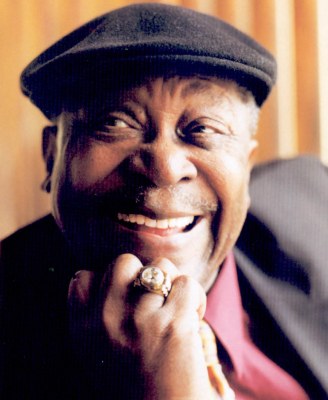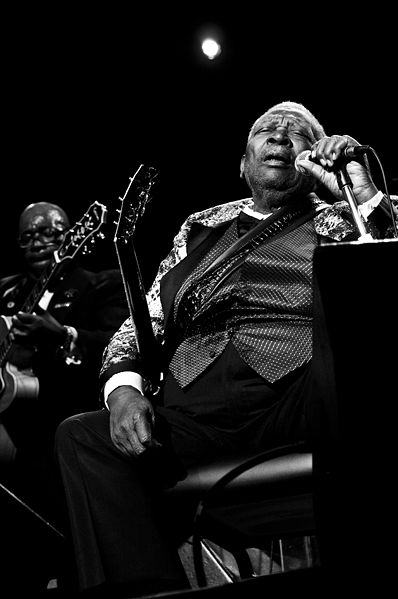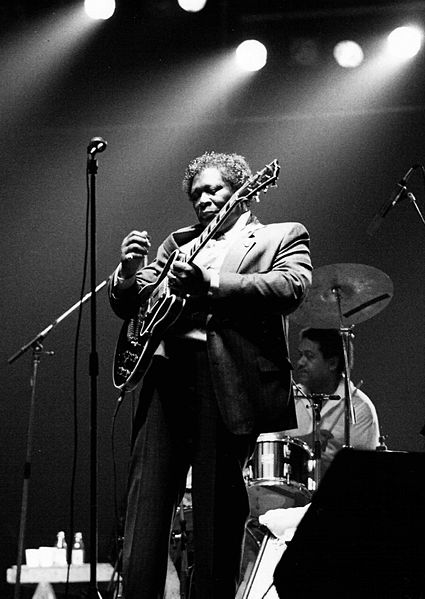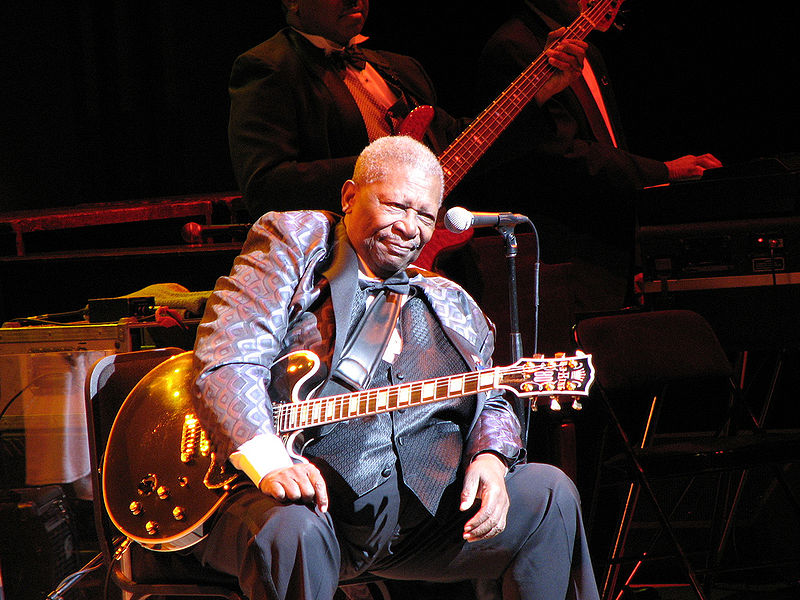<Back to Index>
- Physiologist Albert Szent-Györgyi de Nagyrápolt, 1893
- Bluesman B.B. King, 1925
- Field Marshal Mikhail Illarionovich Golenishchev Kutuzov, 1745

Riley B. King (born September 16, 1925), known by the stage name B.B. King, is an American blues guitarist and singer-songwriter acclaimed for his expressive singing and guitar playing.
Rolling Stone magazine ranked him at #3 on its list of the "100 greatest guitarists of all time." According to Edward M. Komara, King "introduced a sophisticated style of soloing based on fluid string bending and shimmering vibrato that would influence virtually every electric blues guitarist that followed." King was born on a plantation in Itta Bena, Mississippi, a small town near Indianola, Mississippi.
His parents were Alfred King and Nora Ella King. While singing in a
local gospel group, at the age of twelve Riley bought his first guitar
for $15.00. In 1943 King left Indianola to work as a tractor driver. King went to Memphis, Tennessee in 1946, looking for a cousin, Bukka White, who took him in for the next ten months. However,
after a few months of hardship he returned to Mississippi, where he
decided to prepare himself better for the next visit and returned to
Memphis two years later. Initially he worked at the local R&B radio station WDIA as a singer and disc jockey, where he gained the nickname "Beale Street Blues Boy", later shortened to "B.B." It was there that he first met T-Bone Walker. "Once
I'd heard him for the first time, I knew I'd have to have [an electric
guitar] myself. 'Had' to have one, short of stealing!", he said. In 1949, King began recording songs under contract with Los Angeles-based RPM Records. Many of King's early recordings were produced by Sam Phillips, who later founded Sun Records. Before his RPM contract, King had debuted on Bullet Records by issuing the single "Miss Martha King" (1949), which did not chart well. "My
very first recordings [in 1949] were for a company out of Nashville
called Bullet, the Bullet Record Transcription company," King recalls.
"I had horns that very first session. I had Phineas Newborn on piano; his father played drums, and his brother, Calvin, played guitar with me. I had Tuff Green on bass, Ben Branch on tenor sax, his brother, Thomas Branch, on trumpet, and a lady trombone player." King
assembled his own band; the B.B. King Review, under the leadership of
Millard Lee. The band initially consisted of Calvin Owens and Kenneth
Sands (trumpet), Lawrence Burdin (alto saxophone), George Coleman (tenor saxophone), Floyd Newman (baritone saxophone), Millard Lee (piano), George Joyner (bass)
and Earl Forest and Ted Curry (drums). Onzie Horne was a trained
musician elicited as an arranger to assist King with his compositions.
By his own admission, he cannot play chords well and always relies on improvisation.
This was followed by tours across the USA with performances in major
theaters in cities such as Washington, D.C., Chicago, Los Angeles,
Detroit and St. Louis, as well as numerous gigs in small clubs and juke joints of the southern US states. King meanwhile toured the entire "Chitlin' circuit"
and 1956 became a record-breaking year, with 342 concerts booked. The
same year he founded his own record label, Blues Boys Kingdom, with
headquarters at Beale Street in Memphis. There, among other projects,
he produced artists such as Millard Lee and Levi Seabury. In the 1950s, B.B. King became one of the most important names in R&B music,
amassing an impressive list of hits including "You Know I Love You,"
"Woke Up This Morning," "Please Love Me," "When My Heart Beats like a
Hammer," "Whole Lotta Love," "You Upset Me Baby," "Every Day I Have the Blues," "Sneakin' Around," "Ten Long Years," "Bad Luck," "Sweet Little Angel," "On My Word of Honor," and "Please Accept My Love." In 1962, King signed to ABC-Paramount Records, which was later absorbed into MCA Records, and then his current label, Geffen Records. In November 1964, King recorded the Live at the Regal album at the Regal Theater in Chicago, Illinois. King won a Grammy Award for a tune called "The Thrill Is Gone"; his version became a hit on both the pop and R&B charts, which was rare during that time for an R&B artist. It also gained the number 183 spot in Rolling Stone magazine's 500 Greatest Songs of All Time. He gained further visibility among rock audiences as an opening act on The Rolling Stones' 1969 American Tour.
King's mainstream success continued throughout the 1970s with songs
like "To Know You is to Love You" and "I Like to Live the Love". King was inducted into the Blues Hall of Fame in 1980. In 2004 he was awarded the international Polar Music Prize, given to artists "in recognition of exceptional achievements in the creation and advancement of music." Aged
80 at the time, on March 29, 2006, King played at Hallam Arena in
Sheffield, England. This was the first date of his UK and European
farewell tour. He played this tour supported by Northern Irish guitarist Gary Moore, with whom King had previously toured and recorded, including the song "Since I Met You Baby". The British leg of the tour ended on April 4 with a concert at Wembley Arena. And on June 28, 2009 King returned to Wembley arena to end a tour around Great Britain with British blues icon John Mayall.
When questioned as to why he was embarking on another tour after
already completing his farewell stint, King jokingly remarked that he
had never actually said the farewell tour would be his last. In July King went back to Europe, playing twice (July 2 and 3) in the 40th edition of the Montreux Jazz Festival and also in Zürich at the Blues at Sunset on July 14. During his show in Montreux at the Stravinski Hall he jammed with Joe Sample, Randy Crawford, David Sanborn, Gladys Knight, Lella James, Earl Thomas, Stanley Clarke, John McLaughlin, Barbara Hendricks and George Duke. The European leg of the Farewell Tour ended in Luxembourg on September 19, 2006, at the D'Coque Arena (support act: Todd Sharpville). In
November and December, King played six times in Brazil. During a press
conference on November 29 in São Paulo, a journalist asked King
if that would be the actual farewell tour. He answered: "One of my
favorite actors is a man from Scotland named Sean Connery. Most of you
know him as James Bond, 007. He made a movie called Never Say Never Again." In June 2006, King was present at a memorial of his first radio broadcast at the Three Deuces Building in Greenwood, Mississippi, where an official marker of the Mississippi Blues Trail was erected. The same month, a groundbreaking was held for a new museum, dedicated to King in Indianola, Mississippi. The museum opened on September 13, 2008. In late October 2006, he recorded a concert CD and DVD entitled B.B. King: Live at
his B.B. King Blues Clubs in Nashville and Memphis. The four night
production featured his regular B.B. King Blues Band and captured his
show as he performs it nightly around the world. It was his first live
performance recording in 14 years. On July 28, 2007, King played at Eric Clapton's second Crossroads Guitar Festival with 20 other guitarists to raise money for the Crossroads Centre for addictive disorders.
Performing in Chicago, he played "Paying the Cost to Be the Boss",
"Rock Me Baby" and "Thrill is Gone" (although the latter was not
published on the DVD release) with Robert Cray, Jimmie Vaughan and Hubert Sumlin.
In a poignant moment during the live broadcast, he offered a toast to
the concert's host, Eric Clapton, and also reflected upon his own life
and seniority. Adding to the poignancy, the four-minute speech —
which had been underlaid with a mellow chord progression by Robert Cray
throughout — made a transition to an emotional rendition of
"Thrill is Gone". Parts of this performance were subsequently aired in a PBS broadcast and released on the Crossroads II DVD. In June 2008, King played at the Bonnaroo Music and Arts Festival in Manchester, Tennessee; he was also the final performer at the 25th annual Chicago Blues Festival on June 8, 2008, and at the Monterey Blues Festival, following Taj Mahal. Another June 2008 event was King's induction into the Hollywood Bowl Hall of Fame alongside Liza Minnelli and Sir James Galway. In July 2008, Sirius XM Radio's Bluesville channel was re-named B.B. King's Bluesville. On December 1, 2008, King performed at the Maryland Theater in Hagerstown, Maryland. On December 3, King and John Mayer were the closing act at the 51st Grammy Nomination Concert, playing "Let the Good Times Roll" by Louis Jordan. On December 30, 2008, King played at The Kennedy Center Honors Awards Show; his performance was in honor of actor Morgan Freeman. King is slated to perform at the closing ceremonies of the Mawazine festival in Rabat, Morocco, on May 29, 2010. Over a period of 52 years, B.B. King has played in excess of 15,000 performances.
In 1991, B.B. King's Blues Club opened on Beale Street in Memphis, and in 1994, a second club was launched at Universal City Walk in Los Angeles. A third club in New York City's Times Square opened in June 2000. Two further clubs opened at Foxwoods Casino in Connecticut in January 2002 and another in Nashville in 2003. A club in West Palm Beach opened in the fall of 2009 and an additional one, based in the Mirage Hotel, Las Vegas, is due to open in the winter of 2009.
In 2001, King signed on as an official supporter of Little Kids Rock,
a non-profit organization that provides free musical instruments and
instruction to children in underserved public schools throughout the
US. He sits on LKR's Honorary Board of Directors. King
has been married twice, to Martha Lee Denton, 1946 to 1952, and to Sue
Carol Hall, 1958 to 1966. Both marriages ended because of the heavy
demands made on the marriage by King's 250 performances a year. It is reported that he has fathered 15 children. He has lived with Type II diabetes for
over twenty years and is a high-profile spokesman in the fight against
the disease, appearing in advertisements for diabetes-management
products. King is an FAA licensed Private Pilot and learned to fly in 1963 from Chicago Hammond Airport in Lansing, MI (now Lansing Municipal Airport - KIGQ). He
frequently flew to gigs, but under the advisement of his insurance
company and manager in 1995, King was asked to only fly with another
licensed pilot and as a result King stopped flying around age 70. His favorite singer is Frank Sinatra.
In his autobiography King speaks about how he was, and is, a "Sinatra
nut" and how he went to bed every night listening to Sinatra's classic
album In the Wee Small Hours.
King has credited Sinatra for opening doors to black entertainers who
were not given the chance to play in "white dominated" venues; Sinatra
got B.B. King into the main clubs in Las Vegas during the 1960s.
From
the 1980s onward he has continued to maintain a highly visible and
active career, appearing on numerous television shows and performing
300 nights a year. In 1988, King reached a new generation of fans with
the single "When Love Comes to Town", a collaborative effort between King and the Irish band U2 on their Rattle and Hum album. In 2000, King teamed up with guitarist Eric Clapton to record Riding With the King. In 1998, King appeared in The Blues Brothers 2000, playing the part of the lead singer of the Louisiana Gator Boys, along with Clapton, Dr. John, Koko Taylor and Bo Diddley.


